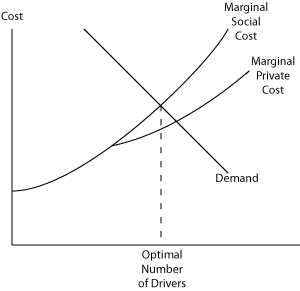|
|
| ||
Automobile Externalities
Cars are important to urban economics because they directly relate to how people move back and forth in a city. Their work may be in the CBD while they may live in subdivisions in the outer areas of the city. About 75% of commuting is done by people traveling in a car alone and another 12% is done by carpooling to and from work. The remaining percentage is split among public transit, walking, and other options. So, it is easy to see why considering congestion externalities generated by commuting in cars is an important issue for study in relation to urban economics.
In recent years, the commute time has been increasing and the average speed has been slowing down since 1990. These factors increase both the monetary and time costs associated with commuting. The main costs arising from commuting are congestion, pollution, and accidents. The one that generally affects most people is traffic congestion. This is because the more people who use the road, the more it will slow down your trip. There are two costs associated with commuting: the private cost and the social cost. The social cost will be higher than the private cost at all points and the optimal number of drivers on the road will be where the demand curve intersects the social cost curve. Because the road is able to be used by anyone, it is considered to be a public good.

Paying the Cost of Commuting
In order to deter some drivers from entering the road, the government can place a toll on the busy roads. This forces people to pay for the costs of crowding the roads. The amount of the toll is determined by the distance between the private costs and the social costs of the trip. Tolling will also be based on location, time of day, and road capacity to make it efficient and effective. The tolls will force people to consider other options such as taking different routes, choosing another mode of transportation, or commuting at different times. All of which will hopefully alleviate some of the congestion that results from commuting. The optimal toll should just cover the costs of the road.
There are several alternatives to tolls but they do not seem to be as effective. The first is a car tax but this may end up charging people who aren't the ones congesting the roads, and this is unfair. Another tax is a gas tax. This discourages driving altogether but has no effect on the timing of commuting or the routes that people choose to use. A third option is a parking tax which hurts downtown and effects cross-town commuters.
| Copyright 2006 Experimental Economics Center. All rights reserved. | Send us feedback |



